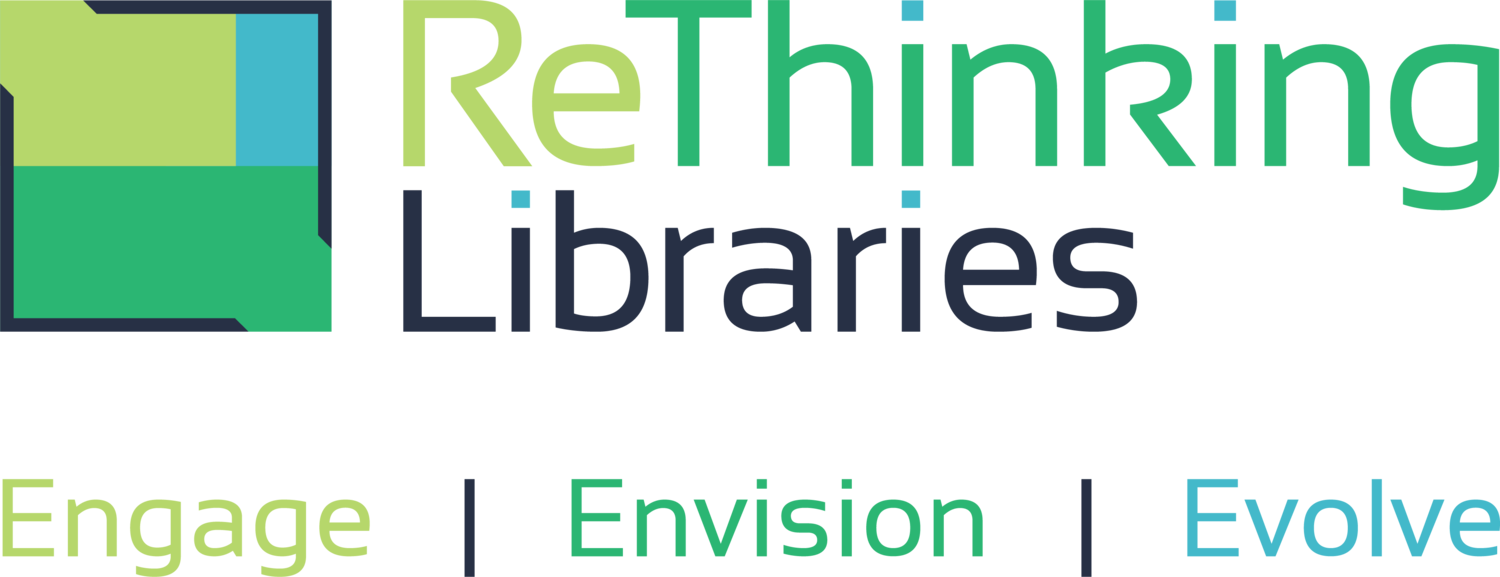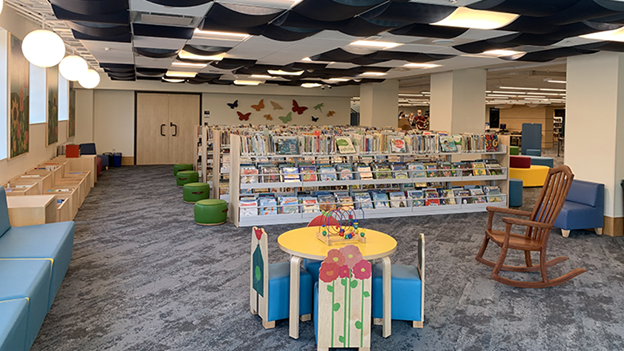Mary Riley Styles Library: A Journey of Adaptation and Growth
Falls Church, Virginia is home to the Mary Riley Styles Public Library (MRSPL), a 125-year-old public library whose recent strategic planning work shows the power of community-focused change. Following a major renovation, MRSPL embarked on a strategic planning process to maximize its new space and address challenges that had previously hindered its ability to serve the public effectively. In a recent interview, Marshall Webster, Acting Library Director, shared insights into MRSPL's challenges, strategic planning, and the exciting path forward.
Photo Credit: David Keith Photography
Using Master Planning for Renovation
MRSPL’s last master plan had been completed in 2010. It was time for MRSPL to undertake a master plan study, laying the groundwork for a renovation that would culminate in a transformative new building to be completed in September 2021. This renovation wasn't just about adding space; it was about reimagining MRSPL's role in the community. According to Webster, MRSPL's strategic plan aimed to maximize the new building by focusing on activities and programs that could leverage the expanded public space.
One of the significant challenges MRSPL faced was the inability to ramp up adult programming and effectively coordinate staff efforts. The renovation provided a solution by intentionally increasing public space by 50%, adding program rooms, meeting rooms, and creating an entire floor dedicated to kids and teens. This expansion was designed with flexibility in mind, ensuring that MRSPL could adapt to the evolving needs of its patrons.
Photo Credit: Mary Riley Styles Public Library
Using Strategic Planning to Address Community Needs
With the renovation complete, next came a strategic plan. Understanding the community's needs was a crucial aspect of MRSPL's strategic planning process. Webster emphasized the importance of taking the community's temperature through a strategic plan, especially after a 2016 referendum and the unprecedented disruption caused by the COVID-19 pandemic. During the pandemic, MRSPL pivoted to curbside and virtual programming, showcasing its adaptability and commitment to serving the public even in challenging times.
The strategic plan also prompted a reevaluation of MRSPL's collection practices as they refit the space to be ADA accessible, losing shelving in the process. The renovation and subsequent strategic planning allowed for significant and strategic weeding of the collection, ensuring that the books on the shelves were those that patrons actively engaged with. This focus on a dynamic, high-circulating collection has shown the public MRSPL's commitment to relevance and responsiveness.
The Power of Expert Guidance
In developing their strategic plan, MRSPL sought external expertise, securing funding to hire consultants and conduct a thorough, objective process. The decision to work with ReThinking Libraries proved invaluable, as it allowed MRSPL to conduct focus groups, elicit meaningful feedback, and make informed decisions without merely confirming pre-existing biases. Webster noted that this expertise saved a lot of time and provided clear guidance without dictating specific actions. “Instead of a laundry list of tasks, we have a framework to develop our own work items over time,” said Webster.
The adoption of the new strategic plan in Spring 2023 marked a significant milestone. One key aspect that set this plan apart was the establishment of a new mission, vision, and values. This foundational rewrite stemmed from a deep reflection on MRSPL's purpose and direction, informed by staff discussions about their love for MRSPL and their aspirations for its future. These elements are now prominently featured on MRSPL's website and in their communications, ensuring that both staff and patrons understand MRSPL's goals and motivations.
Expanding Access and Adapting Services
The first year of implementing the strategic plan has been heavily focused on increasing access. This includes expanding hours, introducing new digital collections software, and critically evaluating barriers to access. MRSPL has also been working on how to optimize the use of new conference rooms and evaluating program offerings to ensure they meet the community's needs and interests.
Staffing has been another critical focus area. With 21.8 full-time equivalent (FTE) positions and 33 employees including temporary workers, MRSPL has had to balance a flat operating budget while trying to do more with less. This has necessitated a redistribution of tasks and workloads, as well as an ongoing analysis to make a case for additional staffing resources.
MRSPL's new staffing model emphasizes flexibility and cross-training, eliminating traditional reference desks and combining reference and circulation services. This approach ensures that staff members are more knowledgeable and capable across various areas, fostering a more cohesive and dynamic service environment. Staff are focused on face-to-face customer service and outreach.
Photo Credit: David Keith Photography
By really emphasizing flexibility and continual reassessment, staff are more willing to make changes. The changes have spread responsibilities, allowing staff to do more. Webster highlighted that this model has empowered staff to be more creative and invested, contributing to a more vibrant and responsive library culture.
Looking Ahead: Flexibility and Continuous Improvement
As the Mary Riley Styles Public Library moves forward, the focus remains on flexibility and continuous reassessment. The pace of change and the expectation of adaptability from the community and governing bodies have increased, but this is seen as a positive development. Webster reflected on the foresight of his predecessor in having the State Library provide change management training for staff prior to the renovation, framing change as a positive and necessary evolution.
Their work has not gone unnoticed. MRSPL is the recipient of two awards from the Virginia Public Library Directors Association (VPLDA). Both awards focused on Virginia libraries serving under 25,000 people. The first award, for Outstanding Program in Cooperation with Other Libraries or Agencies, was given for a panel discussion and community conversation on the history of library desegregation in Falls Church. The program was designed to acknowledge and raise awareness about the history of racial restrictions in libraries serving the black population of Falls Church; highlight the efforts by community activists in the 1950s to secure full library access for everyone; and engage the community in a conversation about how libraries can continue working to guarantee equal access for all.
The second award, the Virginia Public Library Gold Standard of Excellence, recognized MRSPL for meeting the gold level standard in eight categories:
Governance and Administration
Funding
Staffing and Staff Development
Access and Services
Collections
Facilities
Technology
Programming, Publicity, and Advocacy
MRSPL's journey is a powerful example of how intentional planning, community engagement, and a willingness to embrace change can transform a public institution. By focusing on maximizing new spaces, reevaluating collection practices, expanding access, and empowering staff, the Mary Riley Styles Public Library is not only addressing its challenges but also setting a course for a vibrant and dynamic future.



